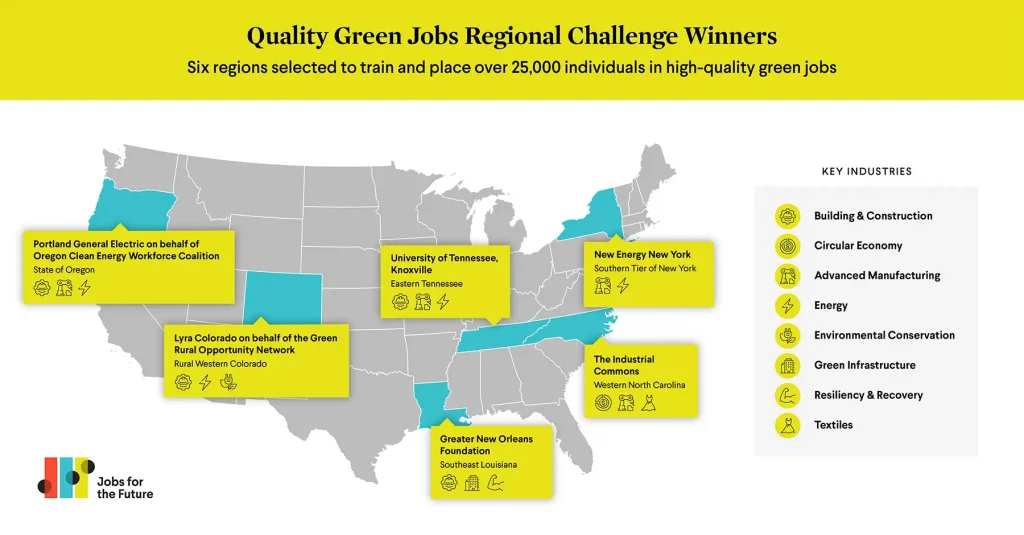UT Wins Funding for Green Jobs Initiative

The University of Tennessee, Knoxville, has received a $750,000 grant for East Tennessee Works (ETW), a regional green jobs initiative focused on Knoxville’s inner-city and rural Southern Appalachia communities.
An interdisciplinary team from UT is one of six groups across the nation receiving funding in the Jobs for the Future (JFF) Quality Green Jobs Regional Challenge. UT is working with community partners, industry, labor, and other education institutions to connect job seekers with training opportunities and support for work in advanced manufacturing and green construction industries.
Over the next three years, ETW intends to place 5,000 East Tennesseans on the path to good jobs in the green economy, with a flexible, scalable approach. Sociology Professor Jon Shefner is principal investigator, and the UT team also includes Stephanie Bohon, head of the Department of Sociology, and Associate Professor Mitsunori Misawa from the College of Education, Health, and Human Sciences.
“Dr. Shefner and Dr. Bohon’s work exemplifies UT’s land-grant mission, as well as the foundational commitment of the College of Arts and Sciences to improve the lives of Tennesseans through community-based, research-driven innovation,” said Professor Patrick Grzanka, divisional dean for social sciences.
“This grant will change individual lives and entire communities in ways that are fundamentally forward-thinking: Their project imagines a future of meaningful work that will help the people of our state navigate the ongoing and pervasive challenges of human-caused climate change,” he continued. “We could not be more proud of them and their colleagues across campus, and we are delighted that their work has been supported by this prestigious and competitive grant.”
UT will be a labor market intermediary (LMI), serving as a hub for employers, workers, training programs, labor, and the community-based organizations that can provide crucial wraparound services, such as help with transportation or child care.
“We will be funding many of these organizations who provide these services,” said Shefner, who also is director of UT’s Community-University Research Collaboration Initiative (CURCI). “We’ll be bringing them together in ways that help recruit potential workers, and we will be reaching out to industry to find out what their hiring possibilities are, their specific needs, and how to bring them together with the newly trained, newly skilled folks.”
“A lot of this is flow-through money,” he said. “This is not staying with the University of Tennessee.”
Two UT students have been hired to work on the project, and there may be opportunities for others in service learning with partner organizations or through Department of Sociology internships.
The grant builds on UT’s ongoing efforts to integrate academic excellence with community service to prepare students and local residents for the high-demand jobs of today and tomorrow.
Filling Job Demand

ETW focuses on workers underrepresented in the green economy and the demand for more skilled workers as jobs are evolving.
Many people are under-employed or over-employed. “They’re working too many jobs for too little money,” Shefner said, or not taking advantage of the skills they have or could have.
With training they can move into jobs that pay $30 or more an hour, with benefits and opportunities for advancement.
“We have all the fragments in place,” Bohon said, and as the LMI, UT will connect them.
Industry and labor offer apprenticeship programs, and the Tennessee College of Applied Technology and Pellissippi State Community College can provide training for positions that don’t require a four-year degree. Community-based programs already are providing services but may need additional staff or funding to help workers overcome obstacles, such as the money to buy work boots or a stipend during training that takes them away from a current job.
UT has been working with organizations in Knox, Anderson, and Campbell counties, including TELOS Global, a manufacturer in Caryville that provides parts for electric vehicles; SEEED (Socially Equal Energy Efficient Development), a nonprofit in East Knoxville that provides career training and is building energy-efficient homes for low-income families; C.O.N.N.E.C.T. (Community Organizations Networking Neighborhoods Encouraging Change Together) Ministries; and a local labor council of the AFL-CIO.
Green Economy Booming
East Tennessee Works is focused on green jobs where companies are reducing their ecological footprint as well as producing components for electric vehicles, installing solar panels, and building more energy efficient structures.
The Brookings Institution identified Knoxville as one of the largest and fastest-growing areas for the green economy more than a decade ago, and the green construction world is set to explode, Shefner said. However, Black and rural communities have been underrepresented, and this initiative is aimed at providing equitable access to training.
The funding announcement came weeks after the region was devasted by Hurricane Helene, a storm fueled by increasing temperatures from climate change. “This should underscore how important it is for us to make changes to the way we do things,” Bohon said.
This is the final round of funding under the JFF Quality Green Jobs Regional Challenge, which the Ares Charitable Foundation funds through Climate-Resilient Employees for a Sustainable Tomorrow (CREST). CREST is a five-year, $25 million initiative that seeks to close the gap between employer demand for a skilled green workforce and the number of people ready for these opportunities to help advance economic mobility.
“These recipients embody the forward-thinking solutions we need when it comes to addressing the dual challenges of climate change and economic inequality,” said Taj Eldridge, managing director for climate innovation at JFFLabs. “We’re proud to support these organizations as they create new opportunities for their communities and develop solutions that contribute to a more sustainable and equitable future.”
“As the world adapts to a changing climate, we are committed to accelerating equity and equality in an expanding green economy,” said Michelle Armstrong, managing director at Ares and president of the Ares Foundation. “Our partnership with JFF allows us to deepen our impact in communities across the US and help create a more prosperous, green, resilient future that benefits generations to come.”
UT was among 20 regional leaders to receive $10,000 grants in the first phase of the JFF challenge and 10 teams to receive $75,000 in phase two for planning.
“The support from ORCA (the Office of Research and Creative Activity) has been crucial,” Bohon said. “I honestly don’t know why anyone in this college would submit a proposal anywhere without going through ORCA, because they take so much of the work off your plate.”
By Amy Beth Miller